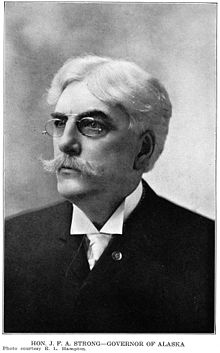John Franklin Alexander Strong
| John Franklin Alexander Strong | |
|---|---|
 |
|
| 2nd Governor of Alaska Territory | |
|
In office May 21, 1913 – April 18, 1918 |
|
| Nominated by | Woodrow Wilson |
| Preceded by | Walter Eli Clark |
| Succeeded by | Thomas Riggs Jr. |
| Personal details | |
| Born |
October 15, 1856 Salmon Creek, New Brunswick, Canada |
| Died | July 27, 1929 (aged 72) Seattle, Washington |
| Political party | Democratic |
| Spouse(s) | Elizabeth A. Aitkens (1879–?) Anna Hall (1896–) |
John Franklin Alexander Strong (October 15, 1856 – July 27, 1929) was a Canadian-born journalist who was the 2nd Governor of Alaska Territory from 1913 to 1918.
Strong was born in Salmon Creek, New Brunswick, Canada to Adam Robert and Janet (Nicholl) Strong on October 15, 1856. He graduated from the New Brunswick Normal School in 1874. After graduation he spent the next fourteen years working as a store owner and teacher throughout the province. On December 31, 1879 he married Elizabeth A. Aitkens of Fredericton, New Brunswick. The marriage produced three children: Jane, Elizabeth, and Robert. He committed bigamy in 1896 when he wed Anna Hall of Tacoma, Washington.
Strong joined the Klondike Gold Rush in 1897. During his travels he worked at newspapers in Dawson City, Skagway, Alaska, and Nome, Alaska. In 1905 he established The Nome Nugget. Strong left Alaska in 1906 to work as an Editor for papers in Tonopah, Nevada and Greenwater, California. He returned to Alaska the next year, publishing the Herald in Katalla. In 1910 he founded the Nugget in Iditarod before becoming publisher of Juneau's Alaska Daily Empire in 1912.
President Woodrow Wilson nominated Strong to become Governor of Alaska Territory on April 17, 1913. The nomination was in keeping with a 1912 Democratic plank calling for territorial governors to be area residents. The new governor was sworn into office on May 21, 1913.
Soon after becoming governor, Strong was faced with a financial crisis. The territory's salmon canneries, claiming the recently enacted tax on canned salmon was illegal, refused to pay. The tax was a major source of income for the territory and the lack of funds thus created severely limited Strong's ability to implement development projects. This issue continued until after the governor left office.
...
Wikipedia
